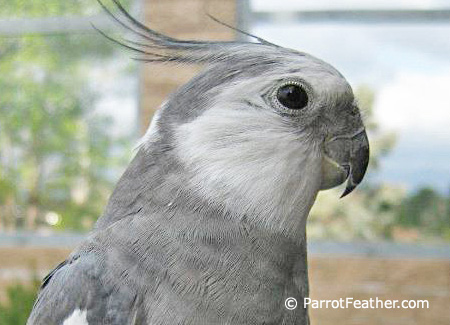Why does my cockatiel bite?

Listed below are common behavior problems reported in pet cockatiels. Simply click the question below for more information. If your questions cannot be found here, please visit or main cockatiel section or stop by our parrot forum and post your questions.
- Why Does My Cockatiel Bite?
- Why Does My Cockatiel Scream?
- Why Does My Cockatiel Hiss?
- Why Does My Cockatiel Stand On One Leg?
- Why Does My Cockatiel Open His Mouth?
- Why Does My Cockatiel Fly Backwards?
- Why Does My Cockatiel Shiver?
- Why Does My Cockatiel Shake Its Head?
- Why Does My Cockatiel Bang His Beak?
- Why Does My Cockatiel Flap His Wings?
Cockatiel Biting
It is important to note that cockatiels are not aggressive birds by nature. Rather, cockatiels have gentle personalities but have learned that biting can be an effective tool to communicating when in captivity. For example, if a cockatiel is not in the mood to be handled and the owner tries to touch the bird, it will bite. In the wild, if a cockatiel wishes to be left alone it can simply fly away from its flock mates—captive birds do not have this luxury. That is why it is crucial a cockatiel owner be aware of their parrot’s body language before handling the bird. This awareness will avoid getting bitten.
Birds give out warning signs to indicate that they don’t want to be
handled. One sign is when a cockatiel lifts its back feathers slightly,
opens its wings, and opens its beak in an aggressive manner.
Additionally, a cockatiel may even hiss. Hissing is a definite and clear
warning to the owner that the bird does not want to be touched.
Aggressive behavior in birds should indicate to the owner that their pet
cockatiel is agitated. If the owner sees their tamed cockatiel acting in
this manner, the cockatiel should be allowed time to settle down before
being asked to step up or be handled.
Once the bird is visibly in a better mood and steps up on command, the
owner should provide the bird with a treat. This treat should be given
immediately after the bird performs. It is immediate positive
reinforcement that will be effective when working with your bird. If
this positive reinforcement technique is used consistently, the
cockatiel will continue to step up without hesitation. This training
technique is used by many professional bird trainers as it has proved to
be highly successful.
The owner of a pet cockatiel should also be aware that there are many
reasons why a pet cockatiel will bite and sometimes it’s difficult to
determine why a bird may do so. Rather than guess as to what the reason
may be, it’s more effective that the owner keep a journal to record all
biting episodes. After a few days of recording these incidents, the
owner will begin to see a pattern and will be more readily able to
determine why the cockatiel is acting out in this aggressive manner.
Once the reason has been determined, the owner can then seek a solution
to help minimize the biting problem.
The usual reason why a pet cockatiel bites is due to fear, tiredness,
unintentional reinforcement, protection of territory, or from being left
alone. It is important the
owner realize that each bird reacts differently to situations and that
each bird has its own personality. This should always be taken into
consideration when trying to solve a problem with your pet parrot.
For a more detailed reason as to why a pet cockatiel bites, see our
cockatiel biting section for an in-depth explanation and solution.




